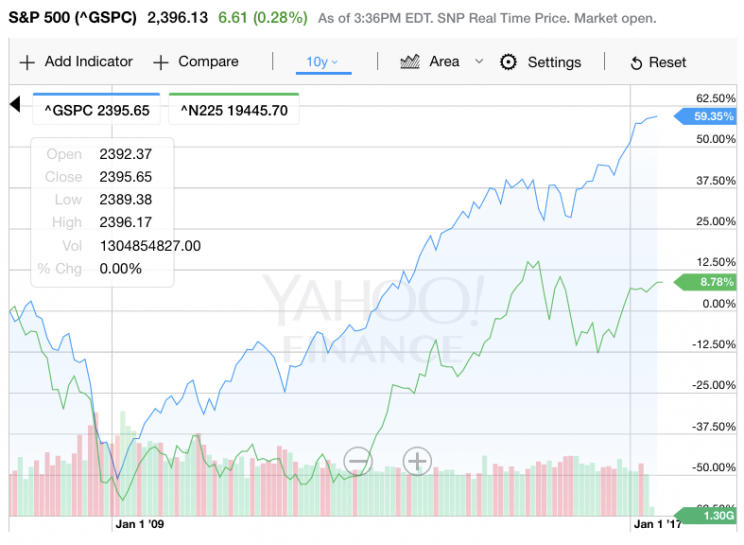The case for investing in Japan
Japan is a sedate, aging giant. For two decades its economy has suffered from deflation, a kind of chronic, free-market lethargy. Its economic growth has lagged America’s diminished rate, and a rapidly aging population suggests a terminal lack of anything to get excited about. China edged ahead of Japan a few years ago to become the world’s second-biggest economy.
But Japan may have a bright future yet. The economic reforms instituted by prime minister Shinzo Abe—known as “Abenomics”—may finally be breaking Japan out of the doldrums. Abenomics consists of aggressive monetary stimulus by Japan’s central bank, amped-up government spending and other measures meant to increase risk-taking and boost economic activity.
After four years of fits and starts, there are signs the Japanese economy is finally starting to get some traction. “The tea leaves are looking better because the labor market is getting very tight,” Paul Sheard, chief economist at S&P Global, tells Yahoo Finance in the video above. “Unemployment is down to 2.8%. There are tight labor markets. I think the Bank of Japan has an opportunity to really push the economy out of deflation by brute force.”
This could have major implications for financial markets. In the United States, aggressive monetary policy by the Federal Reserve triggered a stock market rally that began in 2009 and is still underway—even though the Fed has now been tightening monetary policy for nearly 18 months.
In Japan, the Nikkei index performed well from the end of 2012, which Abe announced his program, through mid-2015, as optimism about the plan buoyed stocks. But the Nikkei is down from those levels, and it has failed to ride the same reinflation trade that seems to be lifting US stocks. This 10-year chart tells the story, with the S&P 500 stock index in blue and the Nikkei in green:

If monetary stimulus ultimately works in Japan the way it has in the United States, that could suggest several more good years for Japanese stocks. “If Japan can win this battle, it will be reflected in markets,” Sheard says. “In a one- to two-year timeframe we should start to see whether this is going to happen or not.” That’s plenty of time to make some money.
Confidential tip line: rickjnewman@yahoo.com
Read more:
Rick Newman is the author of four books, including Rebounders: How Winners Pivot from Setback to Success. Follow him on Twitter: @rickjnewman.

